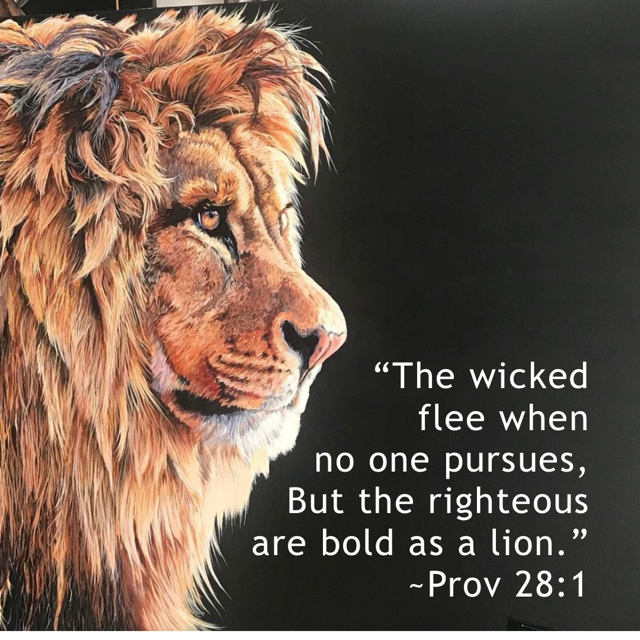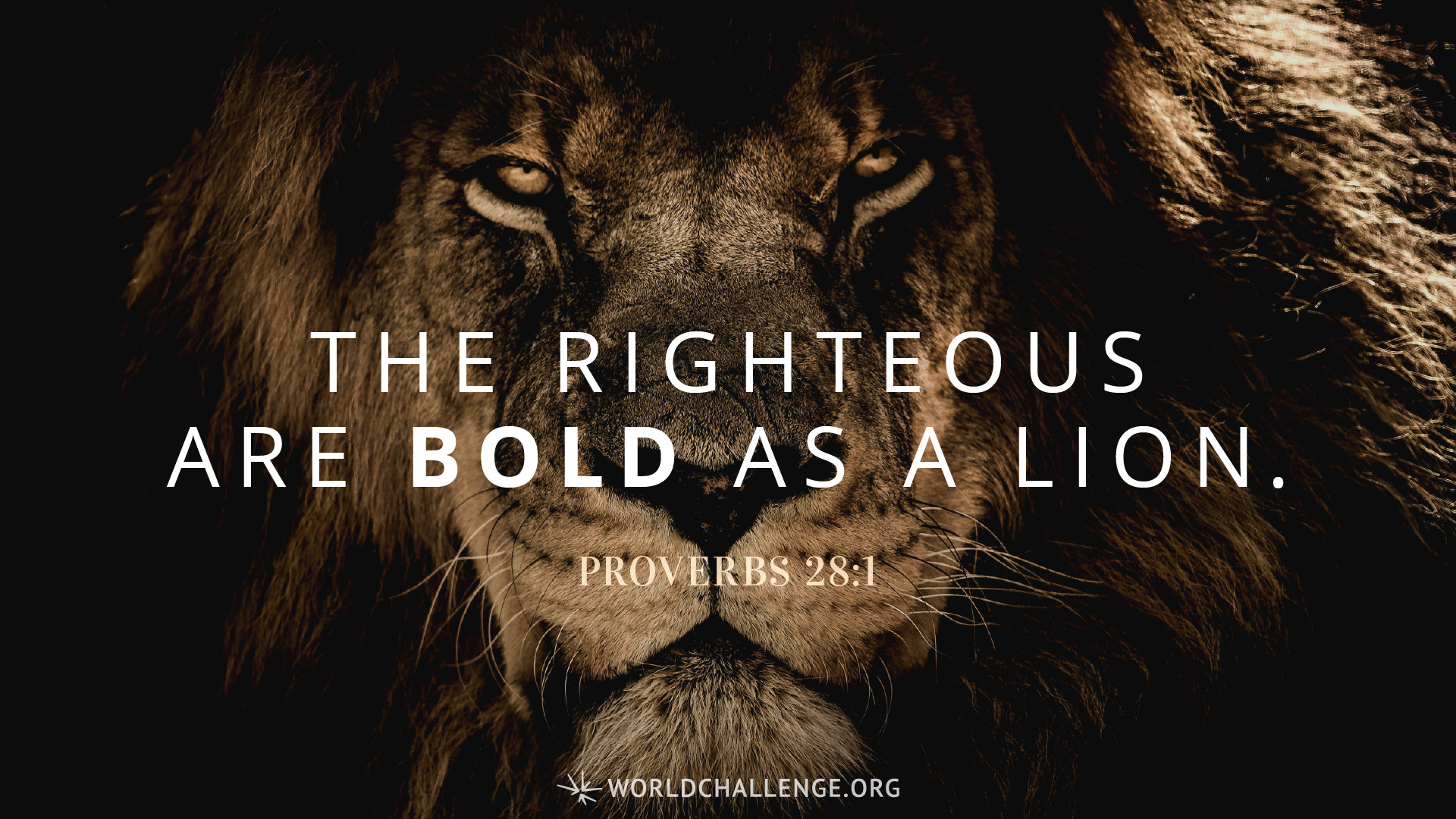PROVERBS 28:1 – The wicked flee though no one pursues, but the righteous are as bold as a lion.
Proverbs 28:1
The wicked flee when no one pursues,
But the righteous are bold as a lion.
- a. The wicked flee when no one pursues: This speaks of a confusion and fear that properly belong to the wicked, not to the godly and wise. This is both because they are under God’s displeasure and because they lack the strength and courage of the Holy Spirit.
- i. “The proverb implies that the wicked, prompted by a guilty conscience or a fear of judgment, become fearful and suspicious of everyone.” (Ross)
- ii. “God sends a faintness into the hearts of the wicked, and the sound of a shaken leaf frightens them. In arithmetic, of nothing comes nothing, yet they fear where no fear is.” (Trapp)
- b. The righteous are bold as a lion: God’s righteous ones stand even when one comes against them, and with God’s strength they are bold as a lion.
- i. The righteous: “The straightforward man, like the lion, has no need to look over his shoulder. What is at his heels is not his past (Numbers 32:23) but his rearguard: God’s goodness and mercy (Psalm 23:6).” (Kidner)
- ii. “Adam knew no fear until he became a guilty creature. But if guilt brings fear, the removal of guilt gives confidence.” (Bridges)
- iii. “Both psychologies are grounded in objective reality. God guarantees the safety of the righteous and dooms the wicked to punishment and disaster.” (Waltke) source
King David wanted to build the temple in Jerusalem and create a magnificent building for God, but the Lord told him that he would not be the one to do it. Instead, the Lord chose his son Solomon. All the officials of Israel gathered in Jerusalem and David announced God’s plan. “[God] said to me: ‘Solomon your son is the one who will build my house and my courts’” (1 Chronicles 28:6).
God’s choice was clear. Seems simple, right? David had already received the building plans from God himself and collected most of the needed materials. All Solomon had to do was start. But right there is so often the place of failure. David understood the challenge facing his son. Throughout the chapter we find him encouraging Solomon: “Be strong and do the work” (v. 10). And “Be strong and courageous, and do the work. Do not be afraid or discouraged, for the Lord God, my God, is with you. He will not fail you or forsake you until all the work for the service of the temple of the Lord is finished” (v. 20).
Despite the fact that Solomon was God’s choice and that he had complete instructions and all of the needed materials, he still had to get past the fear that paralyzes us to inaction. The Message, a contemporary Bible translation, renders verse 10, “And do it!” No one is saying that there will not be opposition or problems, but it is through the Spirit’s impartation of faith and boldness that we can be brave and move ahead with the work God has called us to do.
God has called all of us to something. Jesus said about the moment he will return: “Be on guard! Be alert! You do not know when that time will come” (Mark 13:33). But because of fear, we haven’t always gone out and done it.
The Holy Spirit is greater in power than our shyness or timidity and he is greater than our fear or rejection of failure. His power makes the weakest as bold as a lion (see Proverbs 28:1). source

What does Proverbs 28:1 mean?
This proverb notes one tendency of a guilty conscience: to be defensive even without an accusation. A person who knows they are at fault for something—or believes as much—may become excessive in attempts to clear their name. A related series of English expressions are variations of the phrase, “you protest too much,” adapted from Shakespeare’s play, Hamlet. These are used when another person’s claims of innocence seem insincere and overdone, to the point of suggesting guilt, instead.
Here, Solomon (Proverbs 25:1) depicts morally guilty persons as paranoid, because of their conscience. Their sinful lifestyle leads them to assume that consequences are always just around the corner. In this imagery, they are like criminals who run from law officers who aren’t even aware a crime has happened. In spiritual application, this attempt to “flee” from accountability is a common human response to God. When Jonah refused to obey God, he boarded a ship that was bound for a destination as far from Nineveh as possible (Jonah 1:1–3). When God rains down wrath on the wicked in the tribulation period, world leaders will try to hide from God. They will wish for landslides to hide them from His anger (Revelation 6:15–17).
By contrast, those with a clear conscience (Acts 24:16; Hebrews 13:18) have no such fears. Lions, in most circumstances, fear no predators or hostile enemies. They proceed with confidence and assurance, lacking fear: they are “bold.” The person who does right can rest assured that God will vindicate them in the end (1 Peter 3:16). Just as false guilt exists, so too can a person lack conviction for sin (Matthew 24:38–39; Acts 3:17). Lack of conviction is not a perfect test for righteousness (1 Corinthians 4:4). Yet peace is a genuine benefit of personal integrity (Psalm 4:8; Proverbs 10:9). source

